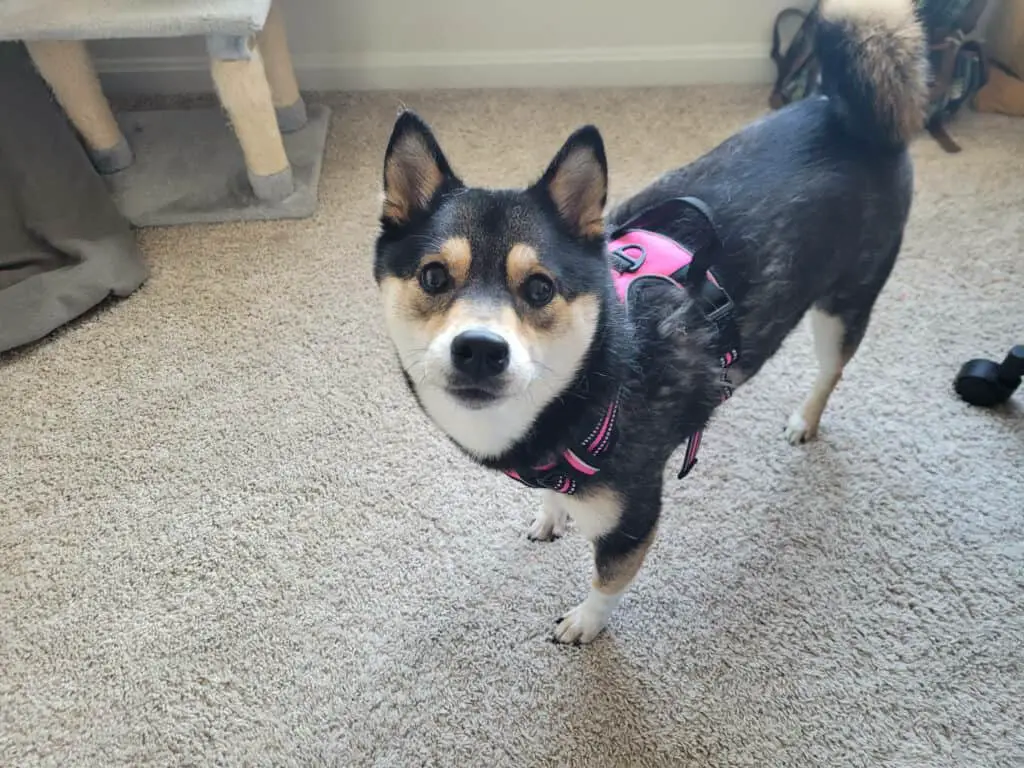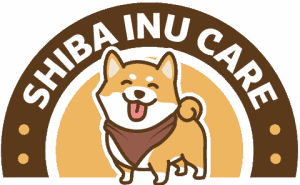This post contains affiliate links.
Shiba Inus are prone to glaucoma, a group of eye diseases that can damage the optic nerve and cause vision loss. Knowing the symptoms and risk factors is crucial for early detection and treatment, which can significantly improve your furry friend’s chances of retaining their sight.

What Is Glaucoma?
Glaucoma is an eye disease that occurs when there is increased pressure within your dog’s eye, specifically affecting the optic nerve. This increased pressure, known as intraocular pressure, can cause damage to the optic nerve, potentially leading to vision loss or even blindness.
Are There Different Types Of Glaucoma For Dogs?
Yes, there are two different types of glaucoma dogs can suffer from:
- Primary glaucoma: Caused by genetic traits
- Secondary glaucoma: Caused by another eye condition, such as cataracts, an eye injury, or lens luxation.
What Age Do Shibas Get Glaucoma?
While glaucoma can technically occur at any age, it is more common in middle-aged to older dogs. Primary glaucoma typically starts showing signs between ages 3 to 8; however, secondary glaucoma can happen at any age, depending on the underlying cause or injury.
Regular veterinary check-ups can help detect early signs of glaucoma and prevent potential vision loss.
Shiba Inus And Glaucoma
Prevalence Of Glaucoma In Shiba Inus
Glaucoma is, unfortunately, a common disease in various dog breeds, including Shiba Inus. It’s an eye condition where the pressure inside the eye increases, often leading to vision loss or even blindness if left untreated.
It’s essential that you, as a Shiba Inu owner, stay informed about the condition, so you can address it early for your pup’s well-being.
Common Signs And Symptoms Of Glaucoma In Shiba Inus
Here’s a list of some common signs and symptoms you should be aware of:
- Redness: Your Shiba Inu’s eyes may look red and irritated.
- Swelling: You might notice your dog’s eyes looking swollen or enlarged.
- Runny eyes: Excessive tearing or discharge is a possible sign.
- Seizures: In some cases, dogs with glaucoma might experience seizures.
- Sensitivity to light: Your Shiba Inu might squint or avoid bright light.
Keep a close eye on your furry friend, and if you observe any of these symptoms, make an appointment with your veterinarian right away.
How Glaucoma Is Diagnosed In Shiba Inus?
Glaucoma tests are performed using a device called a tonometer, which measures the pressure inside your Shiba’s eye. If present, your vet will typically refer you to an ophthalmologist for a more specialized examination and assessment.
If the specialist determines your Shiba does, in fact, have glaucoma, they may perform a gonioscopy and other ophthalmologic examinations to evaluate the iridocorneal angle and eye health.
Early detection is crucial for managing glaucoma in your Shiba Inu, so make sure to schedule regular check-ups with your veterinarian.
Treatment Options For Your Shiba’s Glaucoma
Once your Shiba Inu has been diagnosed with glaucoma, a veterinary ophthalmologist will discuss treatment options with you, which could include:
- Medication: Eye drops or other medications are often prescribed to help lower the pressure in your dog’s eye.
- Surgery: In more severe cases, surgery might be necessary to relieve the pressure or to remove the affected eye.
It’s important to follow your veterinarian’s recommendations and keep an open line of communication to ensure your Shiba Inu receives the best care possible.
Steps You Can Take To Prevent Glaucoma
Keeping your Shiba Inu’s eyes healthy can reduce the risk of glaucoma. One way to do this is by regularly checking your dog’s eye pressure. You can ask your veterinarian to perform a tonometry test during routine checkups. This test helps measure the pressure inside your dog’s eyes, which, if elevated, could indicate a risk for glaucoma.
Besides regular checkups, it’s essential to keep your Shiba Inu’s living environment clean and free from irritants that could harm their eyes. Make sure to clean their face and around their eyes gently, especially after walks and outdoor activities. This will help prevent any infections or debris build-up that might contribute to glaucoma.
Following your veterinarian’s recommendation, you can also provide your Shiba Inu with a balanced diet that’s beneficial for their eyes. Nutrients such as Omega-3 fatty acids, antioxidants, and vitamins C and E can potentially support good eye health.
If your Shiba Inu exhibits any signs of eye discomfort, such as excessive tearing, redness, or sensitivity to light, it’s crucial to take them to a veterinarian as soon as possible. Early diagnosis and treatment can help prevent further damage to their eyes. Remember that glaucoma is a serious condition and requires prompt attention.
Summary
If you own a Shiba Inu, you may wonder if they are at risk of glaucoma, which, unfortunately, they are. Glaucoma is a serious eye disease that can lead your Shiba to become blind if left untreated. Glaucoma happens when fluid builds up in the eye, putting pressure on the optic nerve.
If your Shiba Inu has goniodysplasia, they are more likely to develop glaucoma. Signs of glaucoma include redness, cloudiness, and changes in pupil size. Treatment may involve medication, surgery, or a combination of both.
Regular eye exams can catch glaucoma early and prevent vision loss. As a responsible owner, it is important to keep an eye on your furry friend’s health and seek veterinary care when necessary.
Frequently Asked Questions
What Dog Breed Is Most Likely To Develop Glaucoma?
The Siberian Husky is most likely to develop glaucoma among various dog breeds. However, other breeds like the Shiba Inu, Basset Hound, and Beagle may also be at risk.
How Many Shiba Inus Get Glaucoma?
Although there isn’t a specific percentage available, it’s important to be aware that Shiba Inus can develop glaucoma. Regular check-ups with your vet can help catch any signs early on.
Is Glaucoma Painful For Dogs?
Glaucoma can be painful for dogs. The increased pressure in their eyes can cause discomfort and may lead to more severe symptoms if left untreated. Keep an eye out for redness, squinting, or excessive tearing, as these could indicate a problem.
Can Dogs See If They Have Glaucoma?
Glaucoma can cause progressive vision loss in dogs, and in some cases, it can lead to complete blindness. Early detection and treatment are crucial to preserve your dog’s vision.
Is Glaucoma Different Than Cataracts?
Glaucoma is not the same as cataracts. Glaucoma is caused by increased eye pressure, whereas cataracts are a clouding of the eye lens. Both can affect your dog’s vision, but they require different treatments.
What Dog Breed Is Most Likely To Develop Glaucoma?
As mentioned earlier, the Siberian Husky is the breed most prone to developing glaucoma. Other breeds may still be at risk, so monitoring your dog’s eye health is essential regardless of their breed.
